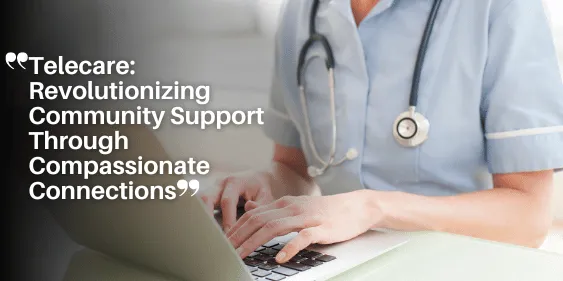Telecare: Revolutionizing Community Support Through Compassionate Connections

Definition and Purpose of TeleCare
TeleCare is a phone-based program designed to combat loneliness and isolation by connecting volunteers with individuals who need companionship.
While the primary beneficiaries are often older adults and those with limited mobility, the program’s reach extends to anyone who could use a friendly voice.
Through regularly scheduled phone calls, TeleCare volunteers provide not only social interaction but also emotional support and essential safety checks, offering a lifeline for those who might otherwise lack social contact.
Importance of Human Connection in the Digital Age
Human connection is more crucial than ever in our increasingly digital age.
Despite the rise of social media and various communication platforms, many people experience a profound sense of isolation.
TeleCare steps in to bridge this gap, prioritizing genuine, compassionate conversations.
Unlike automated messages or impersonal emails, TeleCare offers a human touch that can significantly impact emotional well-being. This human connection is not a relic of the past but a necessary component of a healthy, caring society.
Overview of TeleCare’s Impact on Communities
The influence of TeleCare stretches far beyond individual participants. By fostering consistent communication, TeleCare strengthens the fabric of entire communities.
Volunteers become vital links in a chain of support, identifying needs, offering timely intervention, and promoting a culture of empathy and care. As a result, the burden on healthcare systems and social services is reduced, creating a more resilient and connected community.
This compassionate outreach helps anchor participants within their communities, reminding them that they are valued and not alone.
TeleCare exemplifies the power of community-driven support and has immeasurable value for both participants and volunteers.
From enhancing emotional well-being to acting as an early detection system for health issues, TeleCare serves as a lifeline of connection in an increasingly disconnected world. Continue the journey to uncover how the mechanics of TeleCare bridge gaps through technology.
The Mechanics of TeleCare: Bridging Gaps Through Technology
TeleCare is an impressive system that uses the humble telephone to connect those in need with compassionate volunteers.
This program transcends the limitations of geography, creating a web of support through simple yet powerful means.
Let’s delve into how TeleCare functions and the crucial role that volunteers play.
How TeleCare Operates Using Telephone Technology
At its essence, TeleCare leverages the telephone’s accessibility and reliability.
It fosters meaningful connections between volunteers and participants, ensuring consistent social interaction.
The phone calls are more than casual chit-chat; they serve as valuable moments of human connection, reducing the feeling of isolation that many experience, especially seniors.
Regular Scheduling of Calls and Safety Checks
The success of TeleCare hinges on its regularity. Calls are meticulously scheduled to provide consistent companionship.
Each conversation is an opportunity not only for friendly dialogue but also to perform safety checks.
Volunteers are trained to spot signs of distress, ensuring participants are safe and addressing any immediate needs that may arise.
The Role of Volunteers in the TeleCare System
Volunteers are the heart of the TeleCare system. They dedicate their time and energy to making each call meaningful.
These individuals foster a culture of empathy through their unwavering commitment to connecting with participants.
They aren’t just making calls—they’re building relationships and creating a support system that participants can rely on. This unique interaction enriches both parties, with volunteers finding purpose and fulfillment in their roles.
Ending on a note that underscores these empathetic connections, it’s clear that TeleCare’s telephone-based system is more than just a technological solution; it is a profoundly human one, ensuring that no one feels forgotten or alone.
Combating Loneliness: TeleCare’s Primary Mission
The Growing Issue of Loneliness, Especially Among Seniors
Loneliness has emerged as a significant public health concern, with effects comparable to smoking and obesity.
This issue is particularly acute among seniors, who often face isolation due to limited mobility, the loss of loved ones, or inadequate social networks.
Research highlights the detrimental impacts of loneliness on mental and physical health, including heightened risks of heart disease, stroke, dementia, and even early mortality.
How TeleCare Provides Consistent Social Interaction
TeleCare offers a beacon of hope for those grappling with isolation, particularly seniors.
Utilizing simple yet effective telephone technology, TeleCare volunteers reach out to participants, providing regular check-ins and engaging conversations.
These calls often evolve into meaningful relationships, offering participants a sense of belonging and a reminder that they are valued members of the community.
The Impact of Regular Calls on Participants’ Emotional Well-Being
The emotional benefits of TeleCare’s consistent communication are profound.
Participants frequently report feeling less lonely and more connected to their communities.
These interactions provide comfort and emotional support, which are crucial for mental well-being.
Regular calls ensure that participants feel remembered and valued, significantly bolstering their emotional resilience.
As we recognize the profound effects of combating loneliness through TeleCare, we can appreciate its broader benefits.
These calls not only uplift the spirits of participants but also build stronger, more connected communities, fostering a culture of empathy and care.
The Vigilant Safety Net: Ensuring Prompt Assistance
Conducting Well-being Checks
TeleCare ensures that participants feel seen and cared for through regular well-being checks. These check-ins serve multiple purposes:
- Emotional Support: Telephone conversations offer essential human interaction, which has a profound impact on emotional well-being.
- Safety Assurance: Volunteers perform crucial safety checks to confirm that participants are safe and healthy.
- Listening Ear: These calls provide participants a platform to share their concerns, joys, and stories.
Escalation of Concerns to Appropriate Resources
A critical feature of TeleCare is its structured process for escalating concerns. When volunteers detect unusual behavior or distress, they quickly act by:
- Reporting Issues: Volunteers report any red flags, such as signs of physical or mental health decline.
- Engaging Authorities: Depending on the severity, concerns may be escalated to social services, medical professionals, or family members.
- Follow-up Actions: Volunteers often follow up to ensure that actions were taken to address the issue, providing a continuous safety net.
Peace of Mind for Participants and Families
The presence of TeleCare provides immense peace of mind to both participants and their families:
- Continuous Monitoring: Families can rest assured knowing that their loved ones are regularly checked on.
- Timely Intervention: Immediate response to emergencies or health concerns adds a layer of security.
- Emotional Comfort: Knowing someone cares enough to check in can alleviate anxiety and fear, fostering a sense of community and support.
Through its vigilant safety net, TeleCare not only uplifts participants but also fosters a network of compassion and concern within the wider community.
Strengthening Communities Through Compassionate Calls
Building a Culture of Care and Empathy
TeleCare’s core mission of fostering human connection plays a significant role in building a culture of care and empathy within communities.
By ensuring that vulnerable individuals receive consistent support and companionship, TeleCare demonstrates compassion in action.
Volunteers act as essential links, creating meaningful interactions that remind participants they are valued members of society.
This culture of care not only benefits individuals who receive calls but also permeates community dynamics, encouraging a supportive and empathetic environment.
Reducing the Burden on Healthcare Systems and Social Services
TeleCare’s proactive approach to social interactions helps reduce the strain on healthcare systems and social services.
Regular, compassionate calls can detect early signs of health or emotional issues, mitigating potential crises and preventing unnecessary hospital visits or emergency interventions.
By providing early intervention, TeleCare helps manage problems before they escalate, which can lead to more efficient use of healthcare resources and better outcomes for participants.
Fostering Connection and Belonging
Feelings of isolation can significantly impact an individual’s mental and physical health.
TeleCare combats these feelings by fostering a sense of connection and belonging.
Regular interactions offer participants the assurance that someone cares about their well-being.
This consistent engagement helps build a cohesive community where everyone feels included and supported.
Participants often experience enhanced emotional well-being, knowing they are part of a community that values and cares for them.
By nurturing these compassionate connections, TeleCare creates a stronger, more unified community fabric that benefits everyone involved. This foundation of care and connection has far-reaching implications for fostering physical and emotional wellness.
The Mutual Benefits: Enriching Lives of Participants and Volunteers
Emotional Fulfillment and Sense of Purpose for Volunteers
Volunteering for TeleCare offers a unique and deeply rewarding experience.
Beyond the immense satisfaction of brightening someone’s day, volunteers find a profound sense of emotional fulfillment.
Engaging in regular, meaningful conversations with participants allows volunteers to make a tangible difference.
Many describe the pride and purpose they feel in contributing to the well-being of others, a contribution that fosters a rich sense of community and connection.
Research indicates that volunteering can significantly enhance one’s feelings of happiness, reduce stress levels, and promote a stronger sense of purpose in life. This is especially beneficial for retirees or individuals seeking deeper community engagement.
TeleCare volunteering stands out as a rewarding opportunity, allowing individuals to donate their time and talents while forming meaningful connections that enrich both their lives and the lives of participants.
Heartwarming Stories of Connections Formed Through TeleCare
The transformative power of TeleCare is perhaps best illustrated through the heartwarming stories of connections that are formed.
Volunteers often share touching anecdotes of their interactions.
For example, one volunteer recounted sharing cherished moments over the phone with a widowed veteran, creating an enduring bond that extended beyond mere check-ins.
Stories like these showcase the depth of human connection fostered through TeleCare and its ability to combat loneliness.
Such anecdotes highlight the importance of genuine, consistent social interaction. One study involving a TeleCare program for homebound seniors found that participants reported feeling less lonely and more connected to their communities after joining the program.
These narratives underscore the positive impacts of human connection, proving that even across the distance of a phone call, a sense of belonging and emotional support can flourish.
Positive Impact on Volunteers’ Well-Being and Community Engagement
Volunteers are not the only ones benefiting from the emotional enrichment provided by TeleCare.
The program also positively impacts their overall well-being and sense of community engagement.
The act of volunteering has been linked to improved health outcomes, including increased longevity, better mental health, and reduced risk of depression.
Regularly participating in TeleCare calls provides a fulfilling way to stay active and connected, offering a remedy to the stress and isolation that can sometimes accompany retirement or changes in life circumstances.
Moreover, volunteers’ consistent and compassionate outreach plays a critical role in creating a more connected and supportive community.
Their dedication serves as a beacon of care and solidarity, reminding participants they are valued members of a larger, caring community.
This collective effort not only enhances individual lives but also strengthens the social fabric as a whole, cultivating a vibrant and empathetic society.
The mutual benefits of TeleCare emphasize that the act of giving is just as rewarding as receiving, highlighting the integral role of human connection in enhancing our collective well-being and societal cohesion.






